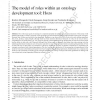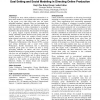276 search results - page 1 / 56 » Role Organization Model in Hozo |
EKAW
2006
Springer
13 years 8 months ago
2006
Springer
The establishment of a computational framework of roles contributes effectively to the management of instance models because it provides us with a useful policy for treatment of vi...
AO
2007
13 years 4 months ago
2007
One of the major goals of ontology is to represent properly the underlying conceptual structure of the messy world reflecting the reality as much as possible. Ontology building to...
CSCW
2012
ACM
12 years 13 days ago
2012
ACM
A challenge for many online production communities is to direct their members to accomplish tasks that are important to the group, even when these tasks may not match individual m...
TAAS
2010
12 years 11 months ago
2010
stractions that support application developers to describe dynamic organizations. The organization model is part of an integrated approach, called MACODO: Middleware Architecture f...
ATC
2009
Springer
13 years 11 months ago
2009
Springer
Abstract. An Organic Computing system has the ability to autonomously (re-)organize and adapt itself. Such a system exhibits so called self-x properties (e.g. self-healing) and is ...


